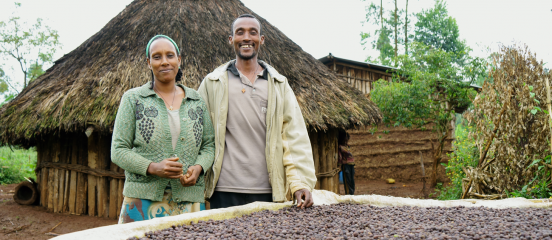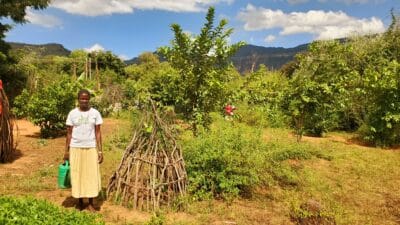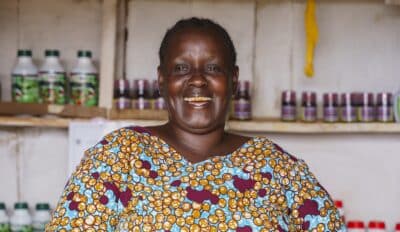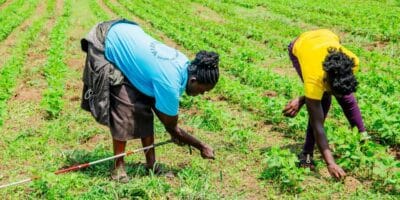Expert view
23 November 2016
How Africa’s farmers can meet demand for traceable products

 By Nicolas Mounard, CEO, Farm Africa
By Nicolas Mounard, CEO, Farm Africa
This week in London the Food Matters Live event brings together the UK food industry to discuss diet, health and our food and drink landscape.
It’s an event that highlights the growing demand amongst British consumers for more information on where the food on their plates comes from and the people behind it.
This demand is fuelled by a number of factors: concerns about their own health, and the health of the planet, as well as growing ranks of foodies ever eager to sample the most exquisite food on offer.
It’s a trend that is set to continue.
Organic sales are set to break the £2 billion mark this year and health-conscious consumers are increasingly looking at plant-based diets and sustainable, alternative protein sources. All of which creates new opportunities for food producers and more reasons to source directly from smallholder farmers.
However, most smallholders, particularly those in Africa, simply do not have access to global markets and end up selling their produce at their farm gate for a fraction of the price they could command by selling further afield.
Bridging the gap between smallholders in rural Africa and food importers in the UK could benefit UK consumers, UK producers and African farmers alike, while also protecting the environment.
NGOs like Farm Africa can play a valuable role in forging links between the global private sector companies and small-scale producers in Africa. We cover a wide range of commodities, from coffee to sorghum to sweet potatoes to sesame, many of which are in high demand internationally as well as locally.
It’s clear from my work with Farm Africa and my previous experience with Twin Trading, an ethical trade organisation that represents 300,000 coffee, cocoa and nut producers globally, what the private sector wants from rural communities.
They want raw or semi-raw products, at a fair price, that are consistent in quality and to know that the people they are dealing with can meet demand if it increases. Worry that a supplier won’t be able to deliver the goods when they really need them will deter all but the most ethically committed company.
In Ethiopia, Farm Africa is working closely with communities living in Afromontane rainforests to help them develop profitable businesses from harvesting and selling the Arabica coffee that grows wild under in the shade of trees.
 The potential demand from the international speciality coffee market for this light, fruity, organic coffee is huge. But most forest communities have not been able to benefit much from producing and selling it.
The potential demand from the international speciality coffee market for this light, fruity, organic coffee is huge. But most forest communities have not been able to benefit much from producing and selling it.
Farm Africa works directly with the farmers to help increase their production volumes, standards and quality assurance of this wild forest coffee. Practical support is given to improve fermentation, drying techniques and sorting processes, and to form collectives who can market the coffee in bulk.
Farm Africa then works with partners in the private sector to place this coffee in the coffee cups across the world. This is done by helping to find markets, by talking to roasters in the UK and the US, to see if they have an interest in this balance between a high quality product and a great environmental programme.
It’s not just the farmers who will benefit: the project also helps prevent deforestation by giving the community a lasting incentive to protect trees rather than clearing them to grow crops or make charcoal.
The beauty industry has also demonstrated how against all odds it can be a powerful agent of change when it comes to sustainable supply chains.
Olivier Baussin, creator and founder of L’Occitane, is a great example of a entrepreneur committed to sustainably sourcing raw materials from Africa.
The first importer of traditional shea butter from Burkina Faso, L’Occitane has now imported more than 500 tons of the product known locally as ‘women’s gold’ due to its value as a revenue stream for the women who produce it. To date, the company’s purchases of shea butter have benefitted 200,000 women and their families.
Along the way there have been huge problems but each time a solution has been sought and found. L’Occitane has successfully worked with NGOs to provide these solutions, provide the necessary processing equipment and support to organise the isolated women producers into collectives.
This collective force has enabled the women producers to achieve better prices for their shea butter, meaning they can now provide better food, education and healthcare for their children and themselves, without relying exclusively on their husbands.
And that’s something we see time and again in the food sector too: with women making up 40 percent of the agricultural labour force in developing countries, by empowering smallholders, you empower women. And when women prosper, they tend to invest more in their homes and families, giving their children more nutritious food and keeping them healthy.
As demand for traceable products continues to rise, there is even more reason for NGOs, big business and small-scale producers (particularly women) around the world to unite and find sustainable solutions to meeting this demand.
This blog was first published on WriteYou – the social network for news.




